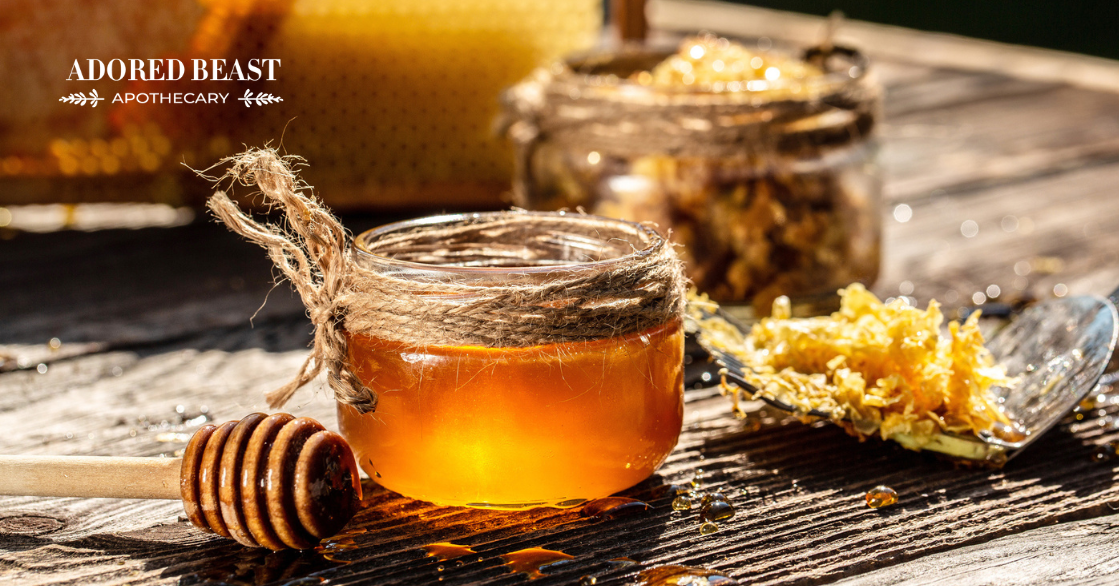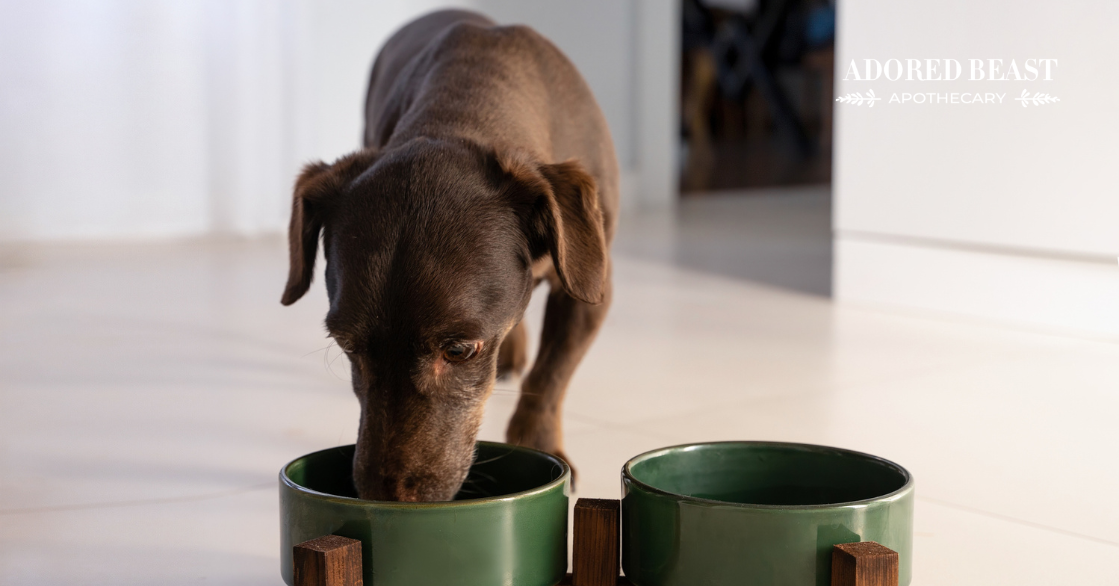Honey has been used for centuries not only as a natural sweetener but also as a holistic remedy. The earliest known use of honey as a medicinal remedy dates back to around 2100-2000 BC, where it was used in prescriptions for various ailments, including skin infections and ulcers.
Today, it remains a celebrated natural remedy, and not just for humans. In recent years, many pet parents have started exploring the benefits of honey as a natural supplement for their furry friends. In this blog, we’ll dive into the benefits of honey for dogs, how it can be used to help with common ailments, important cautions, and guidance on what type of honey is safest for your canine companion.
The Benefits of Honey for Dogs
Honey is packed with essential vitamins, minerals, and antioxidants that can support your dog’s overall health. Here are some of the top benefits of honey for dogs:
Natural Antioxidants and Antimicrobial Properties
Honey is rich in antioxidants that help combat free radicals, supporting overall health. Its natural antimicrobial properties make it useful in promoting healing of cuts, wounds, and skin infections and it can also aid in fighting minor infections. You can use honey as a gentle, natural remedy to soothe minor wounds and burns due to its antibacterial qualities.
Allergy Relief
Many pet enthusiasts believe that local raw honey can help with mild seasonal allergies in dogs. The idea is that small exposures to local pollen present in the honey might help build a tolerance. While scientific evidence is still emerging on this use, some anecdotal reports suggest improvements in seasonal allergy symptoms. Remember, it needs to be local!
Digestive Health
Honey can be soothing for dogs suffering from minor gastrointestinal upset. Its natural enzymes and mild prebiotic qualities might contribute to a healthier digestive tract by supporting the balance of gut bacteria. Used sparingly, it can be an occasional treat that helps promote a balanced digestive system.
Energy Boost
For active dogs or those needing a quick pick-me-up, honey offers a natural source of simple sugars that are easily digestible. A tiny amount mixed into food or served directly can provide a quick energy boost, especially during times when your dog might feel a bit under the weather.
Cough and Sore Throat Relief
Honey is known for its soothing properties and can help relieve coughing or throat irritation in dogs. (Yes, it’s just like when you drink honey in tea for your own cough or sore throat!) It has antibacterial and anti-inflammatory properties, which make it a great remedy for soothing sore throats or coughs caused by mild respiratory issues. However, it’s important to note that honey should only be used for mild cases. If your dog has persistent coughing or respiratory problems, consult your veterinarian.
How to Use Honey for Your Dog
You can use honey in a variety of ways:
- Direct Application: A little honey can be given directly to your dog as a treat. This is often sufficient to deliver its benefits without overloading on extra sugars.
- Mixed with Food: Honey can be blended with your dog’s regular meal, especially if your pet is reluctant to eat due to a minor illness. It also works as a flavor enhancer.
- Topical Use: Applied directly to small cuts or wounds after proper cleaning, honey can help create a protective barrier and foster a soothing healing environment. However, always ensure wounds are not deep or infected—consult your veterinarian for more serious injuries.
Portion and Frequency: Moderation is key. A general rule is to use just a small amount. It’s a simple sugar, so you don’t want to overdo it. Here are some daily maximums:
- Up to 10lbs – ¼ tsp
- 10-20lbs – ½ tsp
- 20-50lbs – 1 tsp
- 50lbs+ – up to 2 tsp
Cautions and Considerations
While honey has several benefits for dogs, there are some important precautions to be aware of:
- Dogs with Diabetes. Honey is high in sugar, and while it’s a natural form of sugar, it can cause blood sugar spikes in dogs with diabetes. If your dog has diabetes, it’s essential to avoid giving them honey or consult with your veterinarian about how much, if any, would be safe to include in their diet. For diabetic dogs, maintaining a stable blood sugar level is critical, and honey could interfere with that.
- Puppies and Immunocompromised Dogs. Avoid giving honey to puppies under one year old, as their immune systems may not be fully developed. Raw honey may also contain botulism spores, which can be dangerous to very young dogs or those with weakened immune systems. Always opt for pasteurized honey in these cases, or consult your veterinarian for guidance.
- Allergic Reactions. While rare, some dogs may be allergic to honey or its components, such as pollen. If you’re introducing honey to your dog for the first time, monitor them for signs of an allergic reaction, such as itching, swelling, vomiting, or diarrhea. If any of these symptoms occur, discontinue use and consult a vet.
What Type of Honey is Best for Dogs?
Honey can be great for dogs, but we caution against just buying the first one you see on the store shelf. You want to be sure you’re considering a few, specific things. Here’s waht to look for:
Raw, Unprocessed Honey. Raw honey is generally recommended for its natural enzymes, vitamins, and antioxidants that are often lost during processing. Look for local and unpasteurized varieties, which might also contain local pollens potentially beneficial for seasonal allergy management. Check for labels that say “raw” or “unfiltered.”
Manuka Honey. Some pet parents consider manuka honey for its potent antibacterial properties, particularly for topical applications on wounds. Manuka honey can be expensive, and its high potency might not always be necessary for everyday use. We like it mainly for first aid situations.
Avoid Honey with Additives. Stick to pure honey without added ingredients. Flavoured or processed honey products may contain artificial additives, preservatives, or extra sugars that aren’t healthy for dogs. Skip these.
Choosing Honey That Protects the Bees
One final note on honey for dogs – make sure you choose a product that protects the bees! Bees are incredibly important because they play a vital role in pollination, which is essential for the growth of many plants, including a large portion of the food we eat. Bees don’t just help make honey—they help sustain life on Earth.
Choosing honey that protects bees means supporting ethical, sustainable, and bee-friendly practices. Here’s how to do that:
- Look for Local Beekeepers. Small, local beekeepers are more likely to use ethical beekeeping practices and care about the health of their bees.
- Avoid Cheap, Mass-Produced Honey. Large-scale commercial operations may prioritize quantity over bee health, using practices like overharvesting or feeding bees sugar water. Skip ultra-cheap supermarket brands. Price can reflect quality and ethics.
- Research the Brand or Farm. Transparency is key. Ethical beekeepers are usually proud of their practices. Check their website or social media for information on sustainability and hive care. Look for terms like sustainable or regenerative beekeeping, hive health monitoring, and bee habitat preservation
- Look for Certifications. A few examples are:
- Certified Organic: Ensures bees forage in pesticide-free zones (though it’s hard to fully regulate where bees fly).
- Bee Better Certified: Focuses on pollinator-friendly farming, though it’s more common in the U.S.
- Fair Trade: May indicate better treatment of workers and sustainable practices.
Note: Not all ethical honey producers can afford certification, so don’t rely on labels alone.
- Support Beekeepers Who Leave Enough Honey for Bees. Bees make honey to feed themselves. Good beekeepers leave enough for the colony to thrive through the winter.
Honey for dogs can be a natural and beneficial supplement when used thoughtfully. Its antioxidant, antimicrobial, and digestive health properties offer a variety of potential benefits for canine well-being. Use it in moderation and with caution, especially for dogs with diabetes or other underlying health conditions. Always choose high-quality, raw honey. Honey isn’t a cure-all, but as part of a balanced approach to pet health, it might just be the natural boost your furry friend needs.












